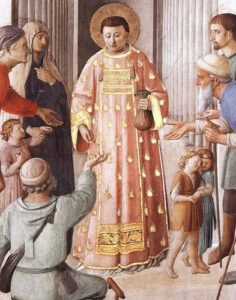Sunday of the Fourth Week in Ordinary Time
Today the Church presents us with some readings and the words of Our Lord regarding the importance of humility, in particular its intimate connection with holiness. In the first reading we hear God’s words exhorting us to be humble: “Seek humility; perhaps you may be sheltered on the day of the LORD’s anger. But I will leave as a remnant in your midst a people humble and lowly.” St. Paul also affirms the importance of humility, saying, “Consider your own calling, brothers and sisters. Not many of you were wise by human standards, not many were powerful, not many were of noble birth. Rather, God chose the foolish of the world to shame the wise, and God chose the weak of the world to shame the strong, and God chose the lowly and despised of the world, those who count for nothing, to reduce to nothing those who are something, so that no human being might boast before God.” God calls the poor in spirit, the humble, and that is why humility is the foundation of the Christian life, the foundation of any vocation or work of God. As a famous thinker said, “God created everything out of nothing, and everything which God is to use He first reduces to nothing,” and He does through humility.
Humility is the most important and fundamental virtues in the spiritual life. According to a tradition, Saint Bernard was once asked what the three most important virtues were, and he replied, “The first is humility, and the second is humility, and the third is humility.” So, in order to understand humility and learn to practice it in our lives, we can examine two points: what is humility, and how do we obtain it. What is humility, and how do we get it?
In the Sermon on the Mount, the first beatitude, that is, the introduction to all the others, is “Blessed are the poor in spirit.” By putting it first, Jesus gives us to understand its importance.
The Greeks had two words to say a poor man. One of those words means the poor person who never had anything extra, that is, a poor person, but who had what was necessary. However, the word that Jesus uses is not that word, but another, ptochos, which means one who is totally destitute, without any resources, totally poor. Such a poor man really realizes how poor he is, and that he cannot do anything without the help of others. As the message to the church in Laodicea said in the book of Revelation (3, 17-18): “For you say, ‘I am rich and affluent and have no need of anything,’ and yet do not realize that you are wretched, pitiable, poor, blind, and naked. I advise you to buy from me gold refined by fire so that you may be rich, and white garments to put on so that your shameful nakedness may not be exposed, and buy ointment to smear on your eyes so that you may see.”
A big problem is that many times we don’t realize how poor we are. So, here we have the first requirement to be humble, and that is to know yourself. The great Saint Augustine very often prayed: “Lord let me know myself in order that I may know You.”
Saint Teresa of Jesus said that humility is nothing other than “walking in the truth,” and walking in the truth means knowing ourselves. This implies, on the one hand, knowing our miseries, our sins, our defects. The word humility comes from the Latin humus, which means earth or dust. Our father Adam was made from the dust of the earth, and we, his descendants, are also dust, as the liturgy of Ash Wednesday reminds us: “Remember that you are dust and to dust you will return.”
At the same time, humility requires that we recognize our talents, gifts, and graces that we have received. Claiming that we have no talents is not humility. However, we cannot glorify ourselves in those things, as if it were something of my own. If I do good works, it is because Jesus works in me, as Jesus said at the last supper: “Without me you can do nothing.” If I have a specific gift, it is because God has given it to me, as Saint Paul says: “What do you possess that you have not received? But if you have received it, why are you boasting as if you did not receive it? (1Co 4, 7). Everything we have is a gift from God; It’s not something that belongs to me. The talents are like the talents in the Gospel according to Saint Matthew: they are lent to me so that I can earn something for God with them.
So, it follows that I also must know God, and His greatness. He is infinite in all His perfections of him. He can’t be encompassed within the imagination or with the created intellect. Ps 89:7: Who in the skies ranks with the Lord? Who is like the Lord among the sons of the gods? For this reason, in order to know God’s greatness we must give up our senses, our imagination, and the limitations of our minds. Ps 97:2: Cloud and darkness surround him; justice and right are the foundation of his throne. 1 Tm 6:16: [He] dwells in unapproachable light. He is infinite in all His perfections. Jb 36:26: God is great beyond our knowledge, the number of his years past searching out. Je 32:19: Great in counsel, mighty in deed. Ws 9:16: Scarcely can we guess the things on earth, and only with difficulty grasp what is at hand; but things in heaven, who can search them out?
With that, we can consider the second point: What must we do to achieve humility? There are three things: two we have already seen, that is, knowing ourselves and knowing God, but we also have to act according to that. Knowing ourselves, knowing God, and acting accordingly.
Knowing ourselves means knowing our defects and our miseries, because that is how we realize how little we are. We also have to recognize how weak we are and how easily we fall into sin. We must also recognize our talents and gifts, but always under the light of the greatness of God who has given them to us to serve him.
Knowing God means that we recognize that all the good we have is given by Him, and recognize His greatness and love.
We also have to act on this knowledge, like the publican did. Saint Padre Pio, in a letter to one of his spiritual daughters, gives six practical tips:
“1. Never sit and take pride in yourself and what you’ve done.
2. Don’t ever mourn over the offenses you receive, no matter where they come from.
3. Excuse everyone with Christian charity.
4. Always cry out to the Lord like a beggar in front of Him.
5. Don’t be at all surprised by your weaknesses but rather, recognizing yourself for what you are, be ashamed of your fickleness and infidelity to God. Abandon yourself totally in the arms of the divine goodness of the heavenly Father and do not fear, because your fear would be more ridiculous than that of a child in his mother’s womb.
6. Never exalt in your virtues, but rather give all honor and thanks to God, because everything comes from Him.”
As Saint Mother Teresa of Calcutta said: “The greatness of our Lady was in her humility. No wonder Jesus, who lived so close to her, seemed to be so anxious that we learn from him and from her but one lesson: to be meek and humble of heart.” Let us ask, then, through the intercession of Mary Most Holy, the Model of Humility, for the grace to know ourselves and God, so that we may always live in humility.







